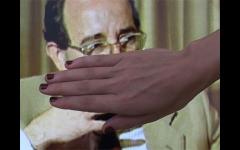Notes on the generation of post-industrial imaginaries through television. A film in 7 parts about ghosts and monsters, made on, with, against, from, for television.
Extended Essay
"The real is always the object of a fiction, that is to say, a construction of space where what may be seen, said, and done meet and take shape. It is the dominant fiction, the consensual fiction which, denying its status as a fiction, parades as the real itself and draws a simple dividing line between the realm of this real and that of representations and appearances... ".
Jacques Rancière. "The paradoxes of political art" in The emancipated spectator (2008)
It was during the 1980s that we witnessed how fundamental changes, which had actually been gestating over the preceding decades, impacted on our economic, political and social scenario leading us to what we now call post-industrial capitalism and to the break-up of the big ideologies, which Zygmunt Bauman referred to as “Liquid Modernity”.
While the American and European liberal democracies carried out their adjustments within the new colonial globalisation processes and the traditional left crumbled in the face of the decline of the working class as it had been understood until the 1970s, the Spanish state delayed its entry into the postmodern project due to its isolation and the dead weight accumulated under a long dictatorship (which still exerts a downward pull today).
Whilst in Europe and the USA it was the most radical right that brought about economic adjustments and dismantled the structures of expression characteristic of traditional forms of struggle (in the shape of Ronald Reagan in the United States or Thatcherism in Great Britain), in Spain it was the PSOE that, after winning the general election in 1982 and, supposedly, putting an end to the transitional process, carried out the industrial restructuring and suffocated and/or co-opted the social movements that had made it possible to recover the rule of law.
In the case of Euskadi and, more specifically, in Bilbao, the dismantling of heavy industry not only produced the destruction of an industrial zone that was key to the local and statewide economy, but also the undermining of the social foundations that had shaped relations within the public space for the whole of the 20th century. The replacement of the old industrial economy with a service economy (prioritised at the urging of the European Union) took on material form with the building of the Guggenheim Bilbao Museum acting as spearhead, but the museum-franchise was actually only a symptom of the replacing of a society of producers with one of consumers, where the cognitarial mass would endure conditions of flexibility and precarity, accompanied by a political dislocation that took them closer to what was traditionally defined as “lumpen”.
Within this dismembering of relations of/at work, in this scenario where work and leisure/consumption merge, and where public spaces are no more than territories of transit and purchasing and selling, we situate our research; in the rethinking of the imaginary of the workers in this informational economy that we form part of. Our attention will focus in particular on the agents and mediators for the crafting of collective memories, and, among them, priority will be given to television as a political instrument of the first order within the framework of Spain and its autonomous community system.
Although in previous decades artists and intellectuals had viewed TV with suspicion or curiosity, but always with interest, with the arrival of video in the 1970s relations with the “original mother” of the medium intensified. From the well-known “video is not TV” argument of the purest of the pure to experiences of guerrilla TV and community video, and a whole range of work that artists and filmmakers such as Alexander Kluge, Rainer M. Fassbinder, Harun Farocki, Martha Rosler, Peter Watkins, etc… made for/about television, the mass media par excellence generally formed part of the panorama of critiques of representation.
It was precisely in the 1980s (perhaps owing to the museumification of video and its conversion into “videoart”) when this intense debate became diluted: artists renounce television as a medium, going completely “apocalyptic” (in the words of Umberto Eco). The idea of an “other TV” disappears or is reduced to minority experiences of resistance, whilst there is a widespread perception of television as a medium of pure entertainment looked down on by a traditional and increasingly obsolete left, and used by rulers as yet another institution of imposed consensus.
During the same decade, autonomous rule and the appearance of the "big propaganda cabinets" that autonomous television channels were to become, arrived practically at the same time in the Spanish state. ETB, the first to broadcast, began to run in 1983, followed later by TV3 and TVG, while Canal Sur and other channels started up somewhat after. With only a slight –and almost non-existent- tradition of independence, the public communications media in the Spanish state were characterised by close institutional relations, a circumstance which became more evident with the arrival of the autonomous TV stations.
Yet it is also true that in the 1980s these autonomous networks were able to produce audiovisual formats and experiments that the ensuing decades would not allow, under the rule of professionalism and the politically correct. Autonomous television in the 1980s opened up the possibility of an “other TV” against the state monopoly of TVE (it must be remembered that private television networks reached Spain in 1990), facilitating spaces for intervention from outside agents from beyond the TV circuit, who renewed formats, and contributed to the normalisation and use of the languages of the autonomous cultures, although it seems pretty clear that they were also privileged instruments of the construction of new imaginaries for “the Spain of design”, of modernisation and change, and fundamental territories for the building of the “consensus of oblivion” that has characterised the Spanish transitional process.
ElectroClass lies at this intersection between the renewed interest that the possibilities of digital TV aroused among researchers and artists (it is no accident that, over this last year, our attention has been captured by a new wave of exhibitions and studies around the relations between art and the televisual medium; one such example is ¿Are you ready for tv? (2010-2011) at the MACBA) and the “archaeological” will to delve into our recent collective memory via ETB’s television archive in order to discern the mechanisms for the actual construction of imaginaries; it is an investigation into the possibilities of constructing an imaginary, one that is our own, of the new post-traditional working class.
This multi-media work is inspired by a will for genealogical continuity, linking our project with other works around the medium, learning from others and other collectives and individuals who have reflected on the relation of TV with historical narratives, but also carrying out our own archaeology and connecting up with the micro-history of consonni, since this production company made “El gran trueque ”, in the year 2000, a project with Matthieu Laurette that took television as a scenario for revealing the new logics of consumption.
With all these premises as our point of departure, we began our investigation some months ago with the intention of formalising it during the course of 2011 in a publicly accessible archive of interviews; in a series of 7 short pieces that involve a kind of disassembly of actual material from the ETB archive and will be broadcast on one of the Basque autonomous TV channels (ETB 3); in a seminar where we would like to bring together some of our referents and accomplices; and in video and cinema programming as part of Zinebi 2011, showing some of these audiovisual experiments produced from/through/in and even against the TV. But always, as Jacques Rancière says, considering that “The collective intelligence of emancipation is not the comprehension of a global process of subjection. It is the collectivisation of the capacities implemented in those scenes of dissensus. It is the enactment of the capacity of anyone, no matter who, or the qualification of those who have no qualification”, or, what amounts to the same thing, that our critical work concerning TV today does not involve confrontation or the ingenuously sterile evidence of the fetichisation that it produces, but a generation of distancing, attempting a subtle, delicate dismembering of the production logic of the real that naturalises the televisual imaginary (just like the simplest and most reactionary documentary imaginary), revealing within it its frameworks of material construction and, in short, its fictional quality.
María Ruido, January - October 2011
workandwords.net/en/projects/view/584
ElectroClass by María Ruido
no.w.here, 316-318 Bethnal Green Road, London

Ad
Event has ended
This event ended on Saturday 16th of June 2012
This event ended on Saturday 16th of June 2012
Admission
£3 for students, £4 for non-students
£3 for students, £4 for non-students
Location
no.w.here, 316-318 Bethnal Green Road, London
Website
Tags:
Art
User Reviews
There are no user reviews
